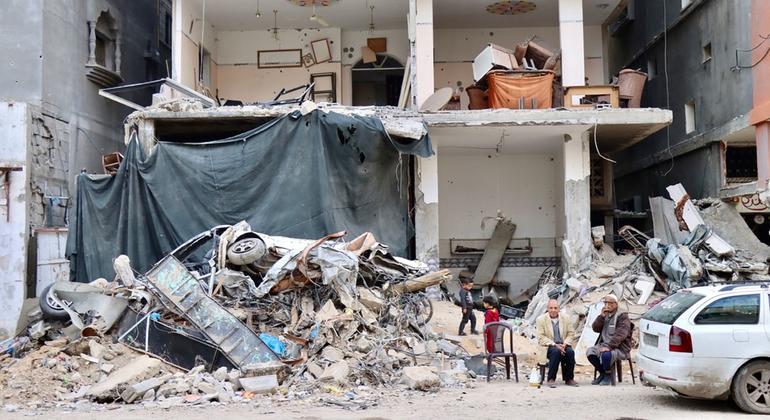
UNRWA staff report that they cannot find food, water or medical care, Commissioner-General Philippe Lazzarini wrote on X.
‘Just waiting to die’
“The smell of death is everywhere as bodies are left lying on the roads or under the rubble. Missions to clear the bodies or provide humanitarian assistance are denied,” he said.
“In northern Gaza, people are just waiting to die. They feel deserted, hopeless and alone. They live from one hour to the next, fearing death at every second.”
Let families leave
Mr. Lazzarini said that throughout the war, some staff stayed in the north and “did the impossible” to support internally displaced people.
Some UNRWA shelters were kept open despite heavy bombardments and attacks on the agency’s buildings.
“On behalf of our staff in northern Gaza, I am calling for an immediate truce, even if for few hours, to enable safe humanitarian passage for families who wish to leave the area and reach safer places,” he said.
“This is the bare minimum to save the lives of civilians who have nothing to do with this conflict.”
The UN and partners estimate that more than 60,000 people have been displaced from North Gaza governorate to Gaza City.
Within North Gaza, about 4,000 people have fled from Jabalia to Beit Hanoun and Beit Lahya, with still others displaced within Gaza itself.
Trapped under rubble
The UN humanitarian aid office, OCHA, is reporting that for five days, people have been trapped under the rubble in the Falouja area of Jabalia.
“Our urgent plea to go and help them has been repeatedly denied by Israeli authorities,” said OCHA’s Gloria Lazic, who is in Gaza.
More than 40 people from three families are reportedly trapped “and we don’t know if we finally get this approval how many will still be alive,” she said, stressing that “every minute counts”.

Children queue for food in Gaza.
Step up aid, improve security: UN envoy
Meanwhile, UN Middle East envoy Tor Wennesland was in Gaza on Tuesday where he saw firsthand the continued destruction and profound suffering of the people.
Mr. Wennesland had meetings with UN staff and non-governmental organizations (NGOs) who told him about the alarming security and humanitarian situation across the enclave, especially in the north.
He said the challenges faced by the people of Gaza, including serious violations of international humanitarian law, are enormous, highlighting the urgent need for food, medical supplies and protection.
“A significant increase in the entry of humanitarian assistance and an improvement in security is urgently required,” he said.
The envoy reiterated the UN Secretary-General’s repeated call for an immediate ceasefire and the unconditional release of all hostages held by Hamas.
“I call on all relevant parties to urgently pursue these goals,” he said. “Gaza is an integral part of Palestine. Ultimately, the solution for Gaza is political.”
‘Horrific’ health situation
The Director-General of the World Health Organization (WHO) also added his voice to the call for a ceasefire.
Tedros Adhanom Ghebreyesus described the health situation in the north as “horrific”, with precarious access to essential care.
He said WHO and partners transferred 14 critical patients and 11 companions from Kamal Adwan Hospital southward to Al-Shifa Hospital as part of a two-day mission.
The transfers were carried out amid hostilities and access restrictions. As a result, the team was forced to stay at Kamal Adwan overnight due to the intense fighting.
Delays and denials
“This was a fourth attempt to reach Kamal Adwan,” Tedros said.
“Despite an initial agreement, the delivery of critical medical supplies, blood, and fuel, which are essential for keeping Kamal Adwan Hospital operational, were denied just a few hours before the mission departure.”
Tedros reported that healthcare continues to be attacked and hospitals starved of supplies and fuel. At the same time, consistent mission delays and denials severely compromise WHO’s ability to regularly reach health facilities.
“We urge for a sustained and safe humanitarian access,” he said, calling for a ceasefire now.
Challenges to healthcare
Humanitarian partners working in the health sector report that communications challenges are hampering efforts to gather information on conditions at the other medical facilities in North Gaza, namely the Indonesian and Al Awda hospitals.
UNRWA noted that none of its medical points in the north are operational, and although teams are ready, they urgently need medical supplies to be able to provide care.